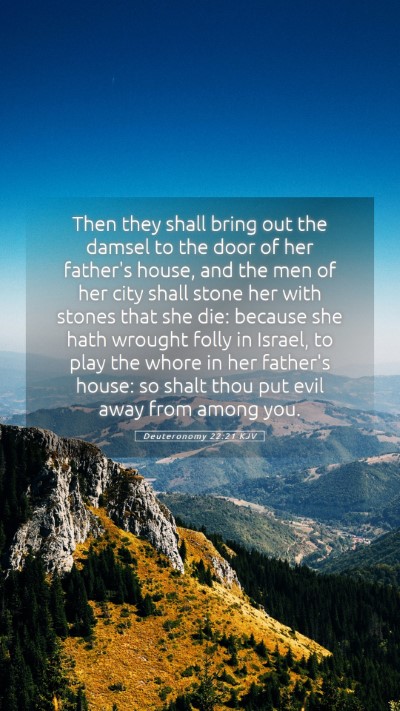Understanding Deuteronomy 22:21
Deuteronomy 22:21 states: "Then they shall bring out the young woman to the door of her father’s house, and the men of her city shall stone her to death with stones, because she has done a disgraceful thing in Israel, to play the harlot in her father’s house. So you shall put away the evil from among you."
Bible Verse Meanings and Interpretations
This verse addresses the severe consequences faced by a young woman accused of adultery or promiscuity within the Israelite community. It evokes a harsh judgment rooted in ancient Israelite law, where maintaining moral integrity and family honor were paramount. Such interpretations encourage a careful analysis of cultural contexts, teachings, and underlying morals drawn from this scripture.
Insights from Commentaries
-
Matthew Henry Commentary:
Henry emphasizes the importance of this statute in maintaining societal order and moral purity. He points out that such draconian measures served both as a deterrent against immorality and to protect family honor, which was essential in ancient Israelite culture.
-
Albert Barnes Commentary:
Barnes elaborates on the cultural implications of the directive, noting that while the punishment may seem severe by modern standards, it reflects the seriousness with which the ancient Israelites regarded sexual immorality. He highlights its role in safeguarding community integrity and the ancestral inheritance of families.
-
Adam Clarke Commentary:
Clarke provides a deep dive into the historical context surrounding the law. He asserts that the verse is a reflection of the patriarchal society of the time, where women's actions were often judged more harshly than those of men. Clarke underlines the need for understanding today's application of such verses within contemporary moral frameworks, emphasizing compassion and redemption.
In-Depth Analysis
When examining Deuteronomy 22:21, it is vital to consider multiple aspects:
-
Cultural Context:
In ancient Israel, a woman's loyalty and chastity were seen as integral to family honor and societal stability. The harsh penalties served as societal safeguards to uphold these values.
-
Moral Lessons:
This passage reflects the broader biblical theme of holiness and purity. It teaches that actions have consequences and underscores the expectation of moral conduct within the community.
-
Modern Application:
Today, while the literal application of such scripture is not observed, the principles of accountability and the need to uphold community values remain relevant. Modern readers are encouraged to interpret these teachings through the lens of grace and redemption.
Biblical Cross References
- Leviticus 20:10 - Discusses similar punishment for adultery.
- John 8:3-11 - Jesus encounters a woman accused of adultery, offering a perspective of grace.
- Deuteronomy 22:13-19 - Outlines laws regarding accusations of infidelity.
Conclusion
Deuteronomy 22:21 serves as a significant passage reflecting ancient laws concerning morality and societal conduct. By understanding the historical context and moral implications while applying the lessons within a modern framework, readers can glean insights applicable to contemporary life.
Overall, this scripture prompts reflection on personal and communal conduct, aligning with the broader biblical themes of holiness, accountability, and grace.


